AWS vs Azure vs GCP: Comparing The Big 3 Cloud Platforms


Cloud computing has revolutionized the way organizations handle digital operations. Amazon Web Services (AWS), Microsoft Azure, and Google Cloud Platform (GCP) are the three cloud service providers dominating the cloud market worldwide.
Most enterprises have moved computing from on-site servers into the cloud and even multi-cloud environments, so that they can benefit from features such as:
The big three cloud computing providers all bring experience and expertise to their reliable and feature-rich platforms. Which is better? AWS vs Microsoft Azure vs Google Cloud?
Here are details of each one, along with an Azure, AWS, and GCP comparison that will help you do your due diligence before making a choice for your company.
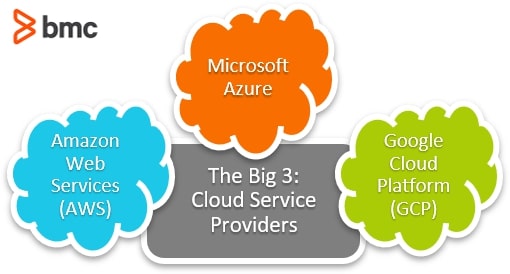
The current market leader is Amazon Web Services, a subsidiary of Amazon.com, Inc. It is the most mature cloud platform and offers a wide range of services to individual developers, small and large enterprises, and governments.
AWS started its life as an internal cloud platform. It evolved into a publicly available, on-demand internet computing resource in 2006, offering services like Amazon S3 cloud storage and elastic compute cloud (EC2). AWS now offers more than 200 fully featured services to millions of users. It rakes in one of every three dollars spent on cloud services, with an annual growth rate of 37%, according to figures published in The Register. It delivered 54% of Amazon’s total operating income in 2023.
Prominent AWS customers include:
(Explore our AWS Guide, a series of articles & tutorials.)
Microsoft Azure is the second-largest cloud platform, but is growing faster than AWS with an annual growth rate of 46%, again as measured in The Register. Microsoft has reported cloud revenue growth of 30% for the quarter ending December 31, 2023. Azure has expanded since its 2010 launch to offer over 200 products and services.
Azure, an offering of Microsoft, is particularly tailored to support Microsoft-centric enterprises. Moving to the cloud or a hybrid-cloud environment is easier for these organizations. More than 95% of Fortune 500 companies use Microsoft Azure today.
Azure is not limited to Windows-based services. It also supports open-source languages, technologies, and platforms, giving anyone the freedom to build and support any application.
Well known Azure customers include:
(Explore popular Azure certifications.)
Compared to AWS vs Azure, GCP is the smallest of the big three cloud providers.
That said, it is the fastest growing, with a 54% market share growth rate, The Register reports. The company expects the business to grow 20% in 2024.
The GCP currently offers over 200 services spanning computing, networking, big data, and more. Today, GCP consists of services including Google Workspace, enterprise Android, and Chrome OS.
Notable GCP customers include:
When choosing between AWS vs. Microsoft Azure vs. Google Cloud, the first thing to consider is the availability of services in the regions where you operate. Regional availability has a direct impact on performance, like network latency and speed in transmitting data. Compliance issues also vary by region, particularly related to cybersecurity.
As of July 25, 2024, here’s where the big three stand:
When choosing a cloud provider, the first thing to consider is its supported regions and availability. These directly impact the performance of your cloud, due to factors like latency and compliance requirements, especially when dealing with data.
As of September 2021, here’s where the Big 3 stand:
Each of these platforms provide specialized cloud solutions for the government (government cloud). Both AWS and Azure offer specialized services that cater to the Chinese market as well, with data centers located in China.
In making an Azure, AWS, and GCP comparison, it’s important to note that each covers most of the globe. All three are also continuing to expand their coverage by adding more regions and zones to meet the ever-increasing computing demand.
(Get an in-depth look at the Big 3 regions & availability.)
An AWS vs. Azure comparison shows that both have similarly large catalogs of more than 200 services each. GCP is quickly catching up to these leaders. A general breakdown of services is:
Here are the common service offerings of each cloud platform.
This Azure, AWS, GCP comparison of services chart shows how they compete with various technologies across key offerings.
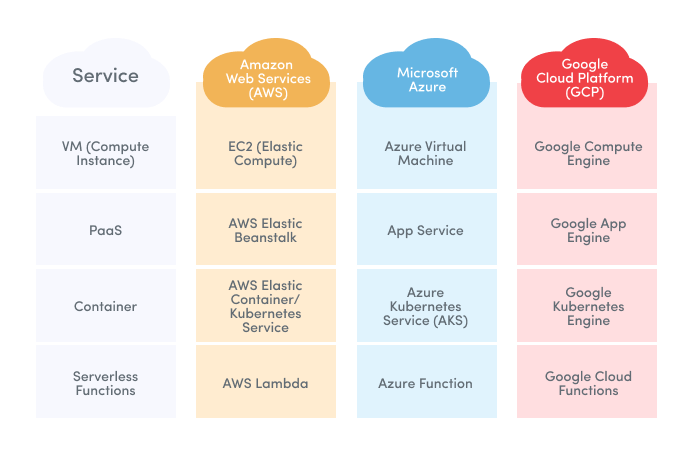
When it comes to storage services, AWS, Azure, and GCP also compete with different database technologies and branded storage solutions.
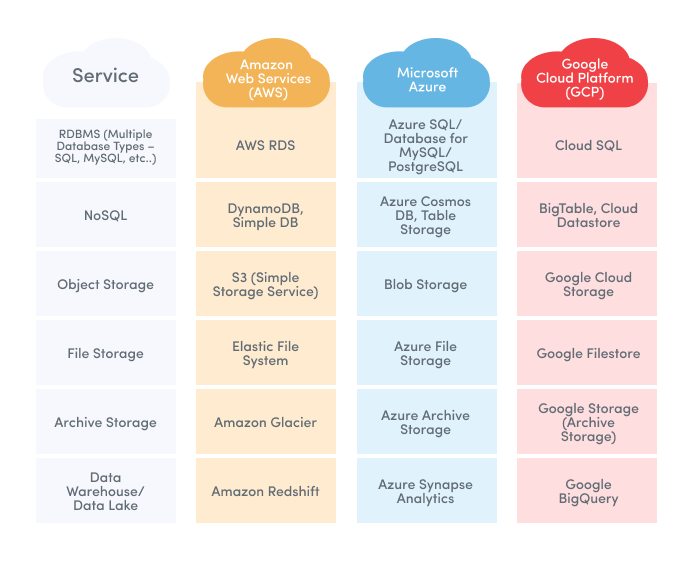
Comparing AWS, Azure, and GCP, each has their own way of handling various aspects of managing networking services.
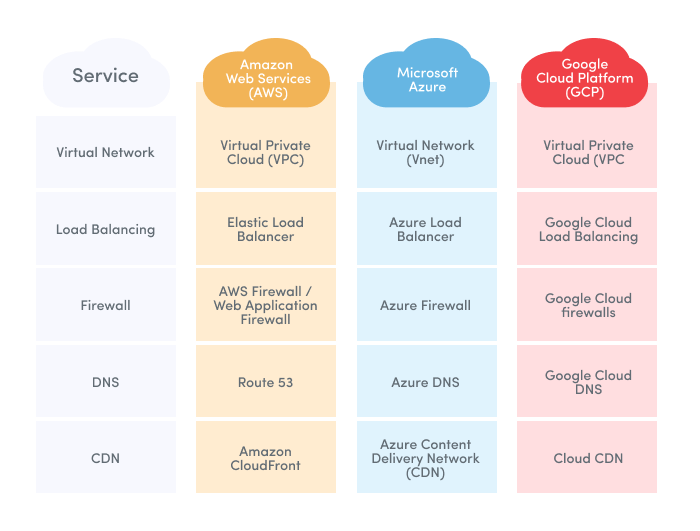 An Azure, AWS, and GCP comparison shows that they all cover common computing needs. Their differences fall into two categories:
An Azure, AWS, and GCP comparison shows that they all cover common computing needs. Their differences fall into two categories:
An area of significant service differences between AWS, Microsoft Azure, and Google Cloud is in specialized services. AWS and Azure are comparable, with GCP rapidly catching up.
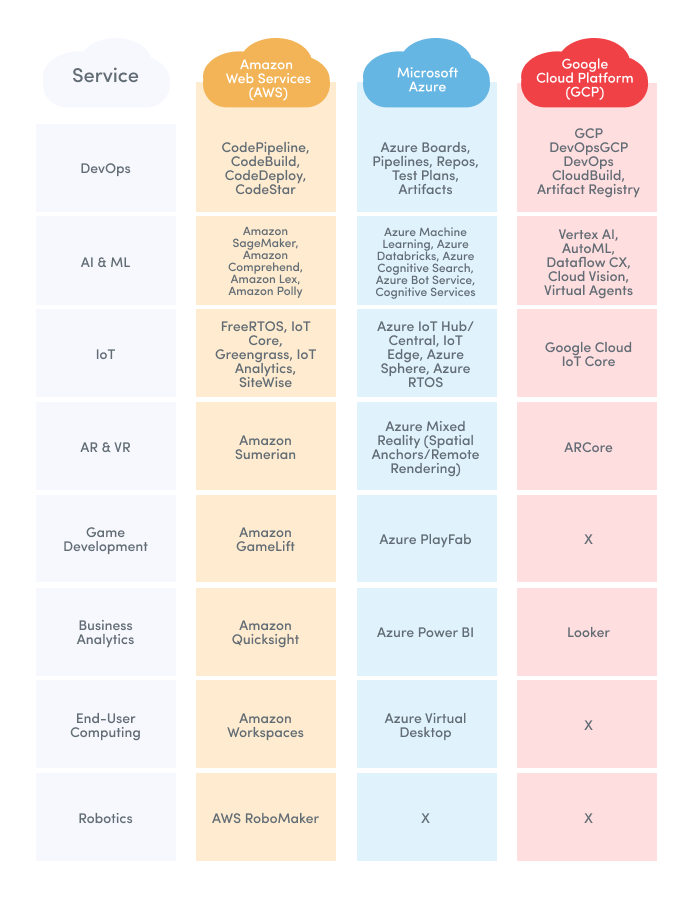 These are only some of the specialized services available on these platforms. AWS customers can even dabble with quantum computing using Amazon Braket.
These are only some of the specialized services available on these platforms. AWS customers can even dabble with quantum computing using Amazon Braket.
AWS vs Microsoft Azure vs Google Cloud compete on both price and value. Their pricing plans are based on these factors:
All three platforms offer competitive pricing plans with additional cost management options—reserved instances, budgets, and resource optimization—available to all users.
The consensus in the IT community is that Microsoft Azure currently has the lowest on-demand pricing, while Amazon tends to come in somewhere around the middle. Enterprise customers already using Microsoft services (Windows, active directory, MS SQL, etc.) have an advantage when they move to Azure, as it is significantly cheaper than other cloud providers.
In evaluating AWS vs. Azure vs. GCP, you will find that each has pros and cons. We’ve simplified the comparison for you here:AWS: Pros and Cons
| AWS: Pros and Cons | |
|---|---|
| Pros | Cons |
|
|
| MICROSOFT AZURE: Pros and Cons | |
| Pros | Cons |
|
|
| GCP: Pros and Cons | |
| Pros | Cons |
|
|
Though AWS is the current market leader in terms of capacity and service, Microsoft and Google are growing quickly to challenge that dominance. To compete with AWS, they are building out facilities, innovating new services, and offering new options in their packages and pricing plans.
Microsoft is challenging AWS by going after the large enterprise market segment. Google is differentiating with multiple integrated open-source projects and third-party services.
Which is right for your company? In making an Azure, AWS, GCP comparison, the right answer depends on your specific use case. In a rapidly evolving cloud technology environment, more customers are implementing multi-cloud strategies to make the best use of each provider’s strengths, without locking themselves to a single one.